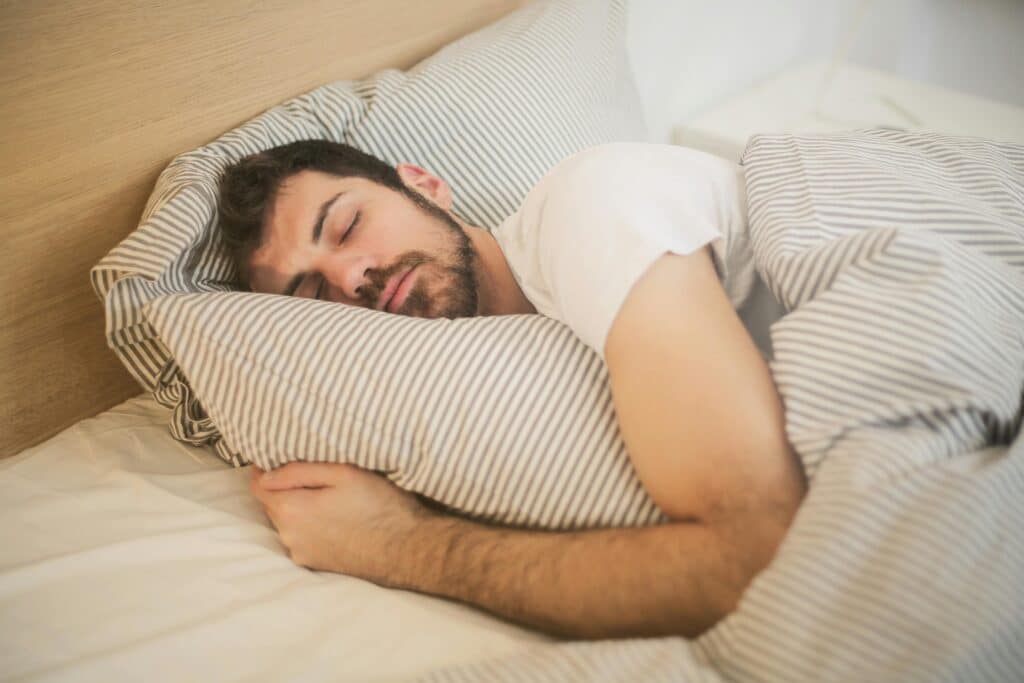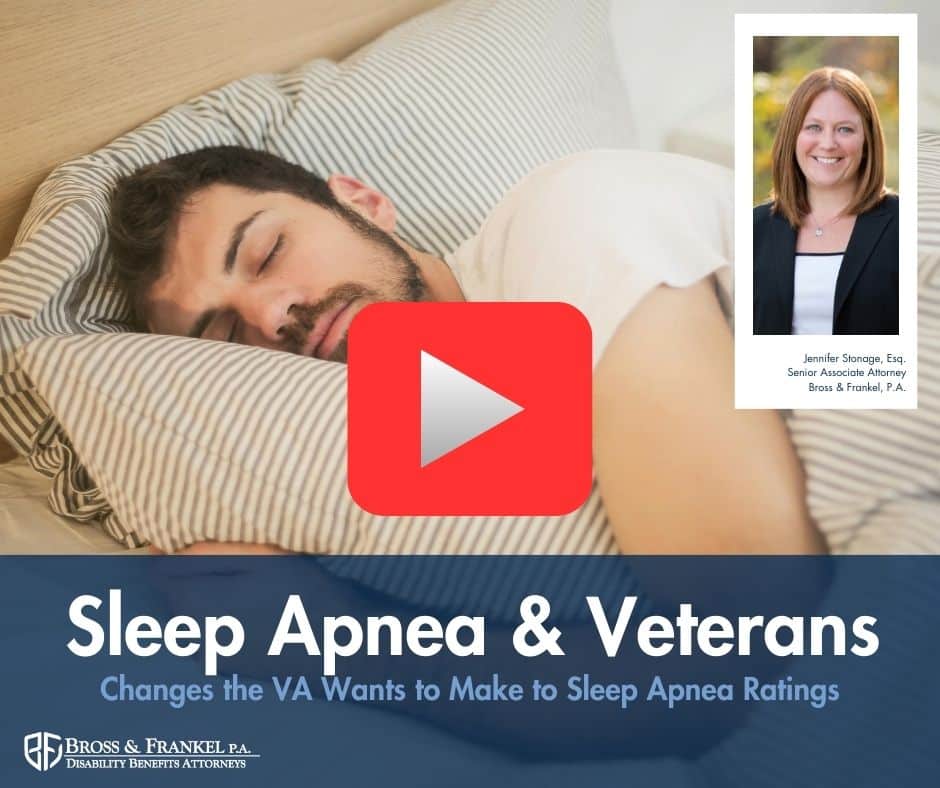
For veterans with sleep apnea, every day can be a struggle when the lack of restorative sleep makes it difficult to focus or complete activities of daily living. If you have sleep apnea that is either the result of your military service or was caused by a different service-connected disability, you may be eligible for disability benefits from the Department of Veterans Affairs (VA).
Without belaboring the issue, VA Disability Ratings are based on the level of disability each impairment causes. If you are service-connected for multiple issues, then the ratings are combined for an overall percentage which dictates what your monthly compensation will be.
HOWEVER…there is a new regulation proposed by the VA that aims at amending the previously adopted schedule of VA ratings specifically for veterans with sleep apnea and could be adopted as early as the summer of 2024. Continue reading for more information regarding these changes.
The Three Types of Sleep Apnea
Sleep apnea is a potentially serious sleep disorder in which a person intermittently stops breathing throughout the night. This can be due to an obstructed airway, it can have more of a neurological basis, or it can be caused by a myriad of other contributing factors. The three main types of sleep apnea are:
Obstructive sleep apnea – This is the most common form. For any number of reasons, the throat muscles relax to the point where your airway is obstructed and you stop breathing.
Central sleep apnea – This form of sleep apnea is less common and occurs when signals from the brain to the muscles that control breathing aren’t firing properly.
Complex/mixed sleep apnea – This describes a bit of both obstructive and central sleep apnea.
What are Some of the Causes of Sleep Apnea in Veterans?
Vietnam veterans and those who served after 9/11 have alarmingly high incidents of service-connected sleep apnea. Some of the risk factors for developing service-connected sleep apnea include:
- Age
- Obesity (this is a BIG factor that the VA likes to use to dismiss service-connected sleep apnea)
- Smoking – increases the risk factor 3x
- Psychiatric conditions – including (but not limited to) PTSD, anxiety and/or depression
- Gender – being a male increases the risk factor 2x
- Genetic factors – including a deviated septum
- Facial Trauma
- Toxic exposures – including Agent Orange exposure, burn pit exposure, and Gulf War Syndrome
- Existing conditions – lung disease, high blood pressure, congestive heart failure, diabetes and more
Complications for Veterans with Sleep Apnea
The complications for veterans with sleep apnea that is service-connected can be quite severe. Any situation where you stop breathing for any period of time can be potentially dangerous – even fatal. Veterans with sleep apnea may experience the following complications:
- Daytime fatigue (hypersomnolence) and irritability
- High blood pressure (hypertension)
- Type 2 Diabetes
- Liver problems
- Chronic respiratory failure
- Cor Pulmonale
Current VA Ratings for Veterans with Sleep Apnea
Here’s how the VA currently evaluates service-connected sleep apnea claims:
- A 0% sleep apnea rating: you are asymptomatic but with documented sleep disorder breathing
- A 30% sleep apnea rating: you exhibit persistent daytime hypersomnolence (excessive daytime sleepiness)
- A 50% sleep apnea rating: you require the use of a breathing assistance device such as a continuous airway pressure (CPAP) machine
- A 100% sleep apnea rating: you are in respiratory failure with carbon dioxide retention or cor pulmonale (a condition that causes the right side of the heart to fail) or require tracheostomy.
Proposed Changes to the Current VA Ratings for Veterans with Sleep Apnea
The VA is proposing an adjustment to the current VA ratings for service-connected sleep apnea – and the changes could be coming as soon as the summer of 2024. The new ratings, if approved, would be:
- A 0% rating – you are asymptomatic with or without treatment
- A 10% rating – you have a sleep apnea diagnosis with incomplete relief (as determined by a sleep study) with treatment including a CPAP machine
- A 50% rating – you have a sleep apnea diagnosis with ineffective treatment (as determined by a sleep study) or are unable to use treatment due to comorbid conditions; and without end-organ damage
- A 100% rating – you have a sleep apnea diagnosis with ineffective treatment (as determined by a sleep study) or are unable to use treatment due to comorbid conditions; and with end-organ damage
Although the removal of the 30% rating is unfortunate, the biggest change will be removing the automatic assignment of a 50% rating with the documented need for a CPAP machine. Moving forward, that will likely result in only a 10% rating for veterans with sleep apnea. Of course, there are ways to increase that rating from 10 to 50%. Specifically, the proposed regulation changes would continue to allow for a 50% rating if the veteran has comorbid conditions that interfere with the veteran’s ability to successfully use a CPAP or similar machine.
How Comorbid Conditions Will Affect the New Ratings for Veterans with Sleep Apnea
If this proposal is made into VA policy, any veteran who is prescribed a CPAP machine would not automatically receive a 50% rating. You would get a 50% rating only if CPAP treatment was ineffective (based on the sleep study results) OR you could not adhere to treatment due to another comorbid condition.
Comorbid conditions that would qualify a veteran for a 50% or 100% rating are conditions that, in the opinion of a qualified medical provider, directly impede or prevent the habitual use of a recognized form of treatment shown by sleep studies to be effective in the affected veteran’s case (e.g., contact dermatitis where the mask or interface touches the face or openings of the nose, Parkinson’s disease, missing limbs, facial disfigurement, or skull fracture). However, mental health conditions (including PTSD) can also be considered a qualifying comorbid condition regarding service-connected sleep apnea in veterans. In this case, you would need a doctor to opine that your mental health condition (whether it is PTSD, anxiety, depression, etc.) is a comorbidity that restricts your ability to use a CPAP machine. The VA can’t penalize you if another condition makes it difficult for you to use the CPAP machine. If you think you have another condition that is making it difficult to use the CPAP machine, make sure you let the examining physician know.
Why You Need to File Your VA Disability Benefits Claim NOW
The VA proposed changes to the ratings for veterans with sleep apnea that is service-connected DO NOT affect any individuals who are already rated under the current system – this means you need to act FAST!
If you believe you are a veteran with sleep apnea that is service-connected, applying now could mean the difference between receiving a 50% disability rating that may be reduced to just 10% by this coming summer. For more information on how sleep apnea affects your VA rating, click here to read Rich Frankel’s article on the subject.
Filing for VA Disability Benefits? We Can Help.
Sleep apnea can affect every aspect of your life, from your ability to work to your overall health. Even if your sleep apnea was not directly caused by your military service, you may still be able to receive benefits for this condition if it is linked to a service-related disability. Working with a New Jersey veterans disability benefits attorney can increase the chances of being approved for a combined rating based on your primary condition and sleep apnea.
At Bross & Frankel, we are proud to help the men and women who have served our country. We offer a range of legal services for veterans, including assistance with filing for VA disability benefits. Contact us today at (856) 795-8880, or online to schedule a free initial consultation.
Related: What Conditions Automatically Qualify for Disability?

Jennifer Stonage is a Senior Associate Attorney at Bross & Frankel, P.A. and primarily assists with the firm’s Veteran’s Benefits matters. She believes that the veterans who served our country are entitled to the help and compensation they are entitled to, and will put her knowledge to work to secure the highest possible compensation ratings. The VA process can be incredibly tricky to navigate. Let somebody who knows the system work to help you.
